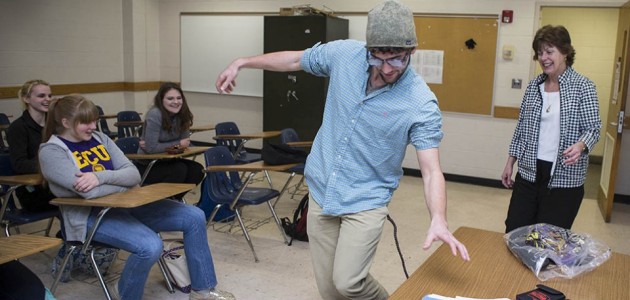Publisher's note: The author of this post, Kathy Muse, is a contributor to ECU News Services.
Required ECU course builds foundation for healthy choices
Messages from Mom and Dad this week most likely will urge East Carolina University students to wrap up in winter coats, hats and gloves before venturing out in the cold.
But parents need not worry — a mandatory ECU course provides students the information they need to make wise and healthy lifestyle choices.
Most students take HLTH 1000 — Health in Modern Society their freshmen year when they are away from home for the first time, encountering new responsibilities and making decisions on their own. Among the difficulties new students often report are anxiety, stress, sleep problems, depression, cold and flu, according to the American College Health Association. The course addresses these health concerns and helps students develop skills in stress management, mental health, healthy eating, weight management and sexual health.
"Our goal for success goes beyond the classroom and is focused on helping students develop lifelong healthy habits," said Debra Tavasso, coordinator of HLTH 1000 and faculty member in the Department of Health Education and Promotion in the College of Health and Human Performance.
As part of the course, students complete a variety of health assessments to identify personal areas of concern and learn about their individual responsibilities regarding their health. They participate in the Wellness Passport program, a class requirement that reinforces discussion topics with co-curricular activities such as the heart health extravaganza and the safe spring break resource fair.
"These events increase students' exposure to wellness concepts in addition to what they are learning in class," said Tavasso.
ECU's assistant vice chancellor for campus recreation and wellness, Nancy Mize, said the passport program provides excellent opportunities for students to gain knowledge and experiences that enable them to make better life choices related to health and wellness. "There is nothing more important than one's personal health and well-being," Mize said.
Students in the course also compete in a blood donation challenge with students taking another required course — Lifetime Physical Activity and Fitness. The volunteers in that competition "learn that when you reach out and help someone else, you receive positive feelings that boost self-esteem and they are sharing that with others," Tavasso said.
The students also become "health ambassadors" by sharing information learned in the class, she said.
Dr. Don Chaney, chair of the Department of Health Education and Promotion, added that the positive health message and information learned in the classroom has the potential to spread throughout the communities of eastern North Carolina.
"Education is one of the strongest influences on public health," Tavasso said. "Students will take the health information learned and use it to not only impact their lives, but also those around them."
Lindsey Holland, now a graduate student in public health in the Brody School of Medicine, took the class her first semester as an undergraduate. She helped someone in her residence hall who was experiencing symptoms of depression by sharing details about available campus resources.
"The class educated me on an array of topics...such as addictions and mental health," Holland said. "I learned not only about the topics as a whole but also specifically how to handle them and what to do if I came in contact with someone struggling with these issues."
Public health studies major Spencer Sanderson said the course reinforced her decision to pursue a health-related career. "I loved all the subjects and how it related to the body," Sanderson said. "I tell people my major is the prevention side of medicine."
Center inspired by HLTH 1000
The East Carolina University Volunteer and Service-Learning Center, which connects ECU students and faculty to community agencies in need of volunteers, grew out of the HLTH 1000 course, when ECU alumna and faculty emeritus Judy Baker was teaching the course in 1989.
Baker was asked by department chair Dr. Rick Barnes to encourage volunteering among her students in the course. An active volunteer herself, Baker already had connections with eight local agencies that could use the help.
She began by introducing the topic of volunteering and its benefits to her mental and social health lecture in three HLTH 1000 classes.
She knew some students would say they did not have time, so Baker added up the hours in a week and subtracted the time required for work, school, sleep and other activities.
Results demonstrated that students could make time for volunteering.
Baker distributed a list of needs from each agency in class, and students selected volunteer opportunities based on their interest.
"We did not know how this was going to turn out," Baker said.
"I presented students with what could be accomplished by volunteering and how this would help the university in its mission to serve."
Word about the volunteer program spread. Baker received calls from administrators asking if their agency could be among those participating. "I never had to call an agency outside of the initial eight," said Baker.
Additional faculty members became involved, offering volunteer opportunities for students related to their chosen career fields. Agency needs ramped up after Hurricane Floyd and the program saw an increase in volunteers.
Jason Denius, ECU academic advisor and former director of the Volunteer and Service-Learning Center, said "Students who needed help themselves from the flood were out volunteering to help others."
By 1999, the program was serving 85 community agencies with more than 7,000 student volunteers. By the end of the 2012-13 academic year, approximately 7,300 students had contributed 110,300 hours of volunteer service to more than 300 community agencies.

Students learn about the impacts of alcohol as part of the required Health in Modern Society course at ECU. Pictured above, ECU professor Debra Tavasso, far right, observes as student Denver Stillman tries to walk in a straight line while wearing goggles that simulate sensory experiences following over-consumption of alcohol. (Photos by Cliff Hollis)

